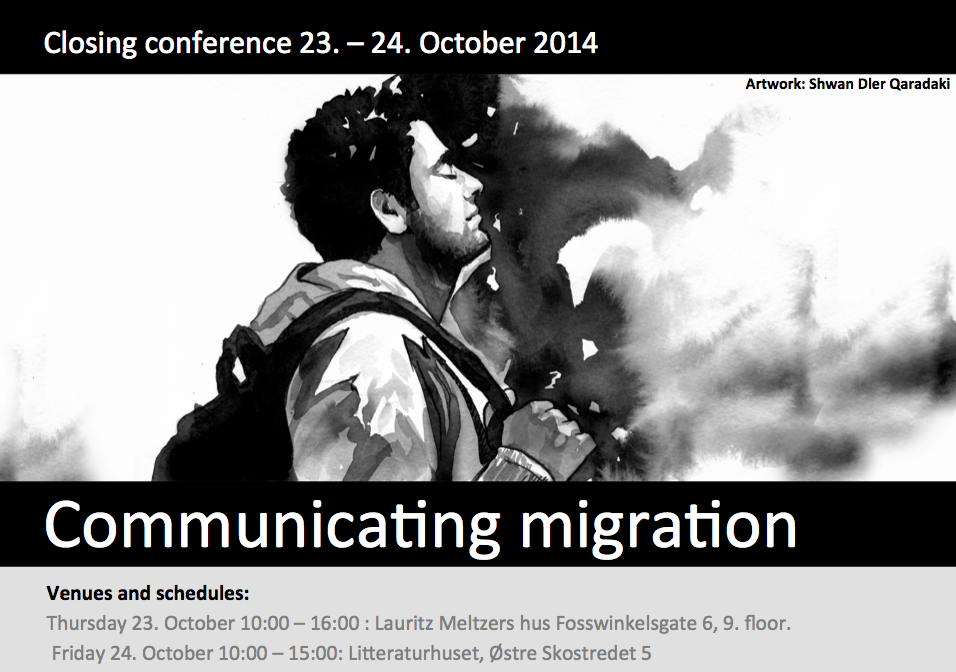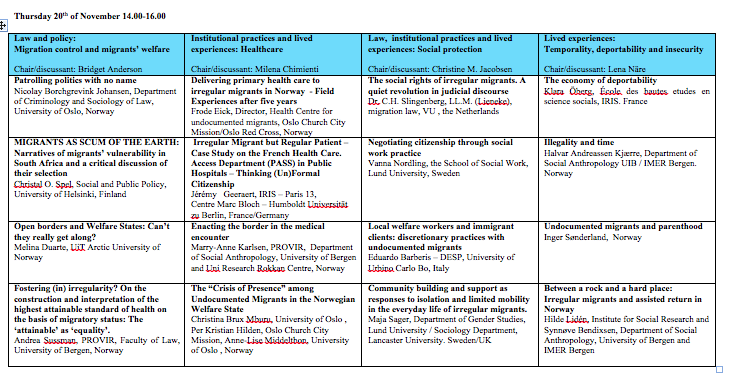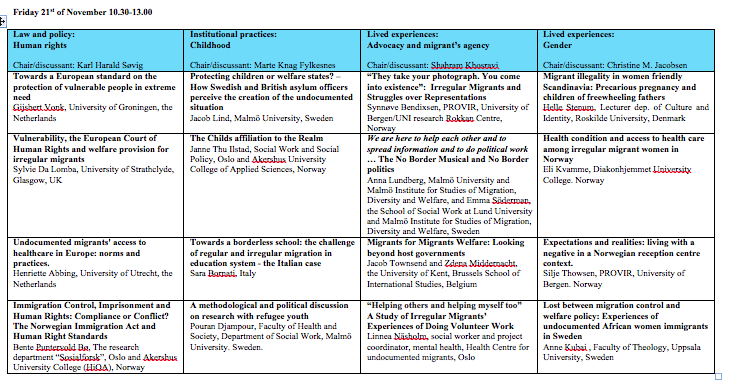The conference is open: No registration
The IMER seminar series for 2014 have covered how migration and ethnic relations are communicated in every-day encounters, in mass and social media, in art, in politics and in research and teaching at the universities. Has the way people talk about migration and migrants in different social contexts changed over time, and in which ways has it changed?
How does migration theory and research relate to other topics and theories in the social sciences, and how do results from migration research inform public debate and policy development? What are the challenges we encounter in communicating migration?
Thursday October 23. 2014
Lauritz Meltzers hus Fosswinkelsgate 6, 9. floor. (in English)
10.00 : Teaching race, Racism and Ethnicity: Education, politics and practice John Solomos
11.00: Studying race and discrimination in a colorblind society: the case of France Patrick Simon
12.00-13.00 Lunch
13.00: Migration and Integration in Norwegian Sociology Mette Andersson
13.30: Distinction Home and Abroad in Migration Research Tor Aase
14.00: Migration and Social Theory Randi Gressgård
14.30: Migration in Literature Studies Lene Johannessen
15.00:Migration in Political Science Hakan G. Sicakkan
15.30: Concluding Discussion
Friday October 24. 2014
Literature house Bergen, Østre skostredet 5, 2nd floor (in Norwegian)
10:00 – 10:15 Velkommen IMER leader Synnøve Bendixsen
10:15 – 10:40 IMDI: Fakta om innvandring til Norge v/ regionsdirektør Bente Blytt
10:45 – 12:00 Norsk-svensk innvandringskrangel– hva handlet den om, og hvor står debatten i dag? v/ Tidl. Statssekretær Ketil Rakes (N) og forfatter Henrik Arnstad (S)
12:00 – 13:00 Pause
13:00 – Å kommunisere migrasjon gjennom film og kunst. Diskusjon med kunstnerne Thomas Østbye og Shwan Dler Qaradaki sammen med antropolog Marry-Anne Karlsen.
14.00 Utstilling og film: Imaging Immanuel (2011. Regissør: Thomas Østbye. 52 min)
IMER Bergen, International Migration and Ethnic Relations, is a multidisciplinary research unit at Uni Research Rokkansenteret and the University of Bergen. The aim of IMER Bergen is to contribute to research-based knowledge about international migration, not least related to European countries, including the consequences of immigration and emigration for societies. IMER Bergen started as a unit at the University of Bergen in 1996, and has since then been an important contributor, both nationally and internationally, to the migration research field. IMER is a prioritized research area at the Faculty of Social Sciences, University of Bergen.
IMER online: http://imer.w.uib.no
Visit IMER on Facebook
For contact, please send email to imer@uni.no
Additional information:
A short introduction to the debate on Friday:
http://www.vg.no/nyheter/meninger/sverige/kronikk-folkhemspopulismen/a/23297613/
Om diskusjonene om migrasjon i kunst og film:
IMER Bergen har som en del av Communicating Migration konferansen invitert to kunstnere til å snakke om sitt arbeid. Begge kunstnerne jobber med migrasjon som tema og i samtalen vil vi ta opp spørsmål som: Hvordan kan migrasjon kommuniseres gjennom kunsten? Hva er forholdet mellom politikk og kunst? Er det likheter mellom kunst og samfunnsfagene? Hvilke dilemmaer star man ovenfor når man representerer andre mennesker gjennom kunst, og hvordan kan man løse slike dilemma. Kan kunsten gi mennesker en stemme?
I foredraget vil antropolog Mary-Anne Karlsen snakke med kunstnerne Thomas Østbye og Shwan Dler Qaradaki.
Thomas Østby, kjent for å ha laget den prisbelønte filmen Imaging Emanuel som vi vises etter samtalen. Østby har også en rekke andre arbeider som har fått anerkjennelse både nasjonalt og internasjonalt. Les mer: http://www.plymserafin.com
Shwan Dler Qaradaki levde i mange som papirløs i Norge selv. Dette har preget hans kunstneriske uttrykk der han er opptatt av tematikk som flukt, konflikt, identitet, tilhørighet og mangfold. Les mer: http://dlerqaradaki.tumblr.com/
Film: Imaging Emanuel
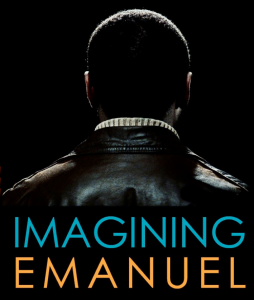 Emanuel har ukjent identitet og oppholder seg illegalt i Norge. Han kom til landet i 2003, men ønsker ikke å leve som illegal, og har forsøkt å få returnere til sitt hjemland uten hell. Han hevder å komme fra Liberia, men norske myndigheter hevder derimot at Emanuel kommer fra Ghana, og har tvangssendt ham dit to ganger. Hver gang har Ghana returnert ham til Norge med beskjed om at han ikke er Ghaneser. Emanuel er dermed dømt til et liv i limbo, uten oppholdstillatelse og rettigheter, men også uten utreisemulighet. Thomas Østbye tilnærmer seg Emanuel ved hjelp av en rekke forskjellige dokumentarsjangere, og de forskjellige avbildningene gir oss ulike inntrykk av den samme mannen. Hvem er Emanuel? Hva er identitet? Hvordan kan identitet avbildes? Hvem besitter sannheten?
Emanuel har ukjent identitet og oppholder seg illegalt i Norge. Han kom til landet i 2003, men ønsker ikke å leve som illegal, og har forsøkt å få returnere til sitt hjemland uten hell. Han hevder å komme fra Liberia, men norske myndigheter hevder derimot at Emanuel kommer fra Ghana, og har tvangssendt ham dit to ganger. Hver gang har Ghana returnert ham til Norge med beskjed om at han ikke er Ghaneser. Emanuel er dermed dømt til et liv i limbo, uten oppholdstillatelse og rettigheter, men også uten utreisemulighet. Thomas Østbye tilnærmer seg Emanuel ved hjelp av en rekke forskjellige dokumentarsjangere, og de forskjellige avbildningene gir oss ulike inntrykk av den samme mannen. Hvem er Emanuel? Hva er identitet? Hvordan kan identitet avbildes? Hvem besitter sannheten?
PROVIR closing conference: “Exceptional welfare: Dilemmas in/of irregular migration”
Wednesday 19th of November
Venue: Det Akademiske Kvarter
18.00-19.30: Letter to the king
Film by Hisham Zaman
Letter to the King portrays five people on a day trip from a refugee camp to Oslo, a welcome change in an otherwise monotonous life. But we soon realize that each and every one of them has an agenda for their trip. All five will make decisive choices on this day, as they discover happiness, humiliation, love or fulfill a long-awaited revenge. The five stories are tied together by a letter, written by eighty-three year old Mirza. Mirza wants to hand over the letter to the King personally.
19.30-21.00: Mediating irregular migration
Researchers, artists, authors, journalists and others contribute to the proliferation of images of the lives, and deaths, of those who migrate without proper authorization from the state. While stereotypical accounts of victims/criminals proliferate in mainstream media – (counter) representations that challenge such stereotyping also exist. The speakers in this panel discussion have all participated in producing and/or analysing images of irregular migration. Taking as their point of departure the film “Letter to the King”, they will discuss the poetics and politics of mediating irregular migration. What (im)possibilities does such mediation offer for current border struggles?
Plenary panel discussion with:
Mehmet Aktas, co-producer and scriptwriter, Letter to the king
Shahram Khosravi, Associate Professor of Social Anthropology, University of Stockholm
Synnøve N. Bendixsen, Post-doctoral fellow PROVIR and Department of Social Anthropology, University of Bergen
Film and panel discussion organized in cooperation with Studentersamfunnet i Bergen (http://samfunnet.sib.no/)
Thursday 20th of November
Venue: Faculty of Law, Magnus Lagabøtes plass 1, University of Bergen
09.30-10.00: Tea, coffee and registrations
10.00-10.15: Welcome address
10.15-11.45: Precarious inclusion: Provision of welfare to irregular migrants in Norway
Presentation of PROVIR research findings by
Christine M. Jacobsen, Karl Harald Søvig, Synnøve Bendixsen, Andrea Sussman and Marry-Anne Karlsen
11.45-12.00: Coffee break
12.00-13.00: Care Beyond Welfare?
Key note lecture by Miriam Ticktin, Associate Professor of Anthropology, The New School for Social Research and Eugene Lang College (US)
13.00-14.00: Lunch
14.00-16.00: Workshops
16.00-16.15: Coffee break
16.15-17.15: Wrongs, Rights and Regularization
Key note lecture by Linda Bosniak, Distinguished Professor of Law, Rutgers School of Law–Camden (US)
19.00: Conference dinner
Nøsteboden
Friday 21st of November
Venue: Faculty of Law, Magnus Lagabøtes plass 1, University of Bergen
09.15-10.15: Limiting Health Care as a Tool of Immigration Policy: Ethnographic Insights into Deservingness and Responses by Civil Society
Key note lecture by Heide Castañeda, Associate Professor and Graduate Director, Department of Anthropology, University of South Florida (US)
10.15-10.30: Coffee break
10.30-12.30: Workshops
12.30-13.30: Lunch
13.30-15.30: Excepted, excluded or precariously included? Dilemmas in/of irregular migration
Roundtable discussion by PROVIR research team and international partners:
Bridget Anderson, Professor of Migration and Citizenship and Deputy Director of Centre on Migration, Policy and Society (COMPAS), University of Oxford (UK)
Milena Chimienti, Professor, University of Applied Science Western Switzerland – Social Work, Haute Ecole Fribourgeoise de Travail Social (HETS) (Switzerland)
Henriette Abbing, (Emiratus) Professor of Health Law, University of Utrecht (the Netherlands)
Christine M. Jacobsen, Professor, PROVIR project leader and Director of Center for Women’s and Gender Research (SKOK), University of Bergen (Norway)
Karl Harald Søvig, Professor, Faculty of Law, University of Bergen (Norway)
Workshop Porgram:
Download workshop program here
Film and panel discussion on the dilemmas of mediating irregular migration
Wednesday 19th of November
Venue: Tegleverket, Det Akademiske Kvarter, Bergen
18.00-19.30: Letter to the king
Film by Hisham Zaman
Letter to the King portrays five people on a day trip from a refugee camp to Oslo, a welcome change in an otherwise monotonous life. But we soon realize that each and every one of them has an agenda for their trip. All five will make decisive choices on this day, as they discover happiness, humiliation, love or fulfill a long-awaited revenge. The five stories are tied together by a letter, written by eighty-three year old Mirza. Mirza wants to hand over the letter to the King personally.
19.30-21.00: Mediating irregular migration
Researchers, artists, authors, journalists and others contribute to the proliferation of images of the lives, and deaths, of those who migrate without proper authorization from the state. While stereotypical accounts of victims/criminals proliferate in mainstream media – (counter) representations that challenge such stereotyping also exist. The speakers in this panel discussion have all participated in producing and/or analysing images of irregular migration. Taking as their point of departure the film “Letter to the King”, they will discuss the poetics and politics of mediating irregular migration. What (im)possibilities does such mediation offer for current border struggles?
Plenary panel discussion with:
Mehmet Aktas, co-producer and scriptwriter, Letter to the king
Shahram Khosravi, Associate Professor of Social Anthropology, University of Stockholm
Synnøve N. Bendixsen, Post-doctoral fellow PROVIR and Department of Social Anthropology, University of Bergen
Film and panel discussion is organized by IMER Bergen in cooperation with Studentersamfunnet i Bergen (http://samfunnet.sib.no/) and is part of the PROVIR-project’s closing conference.
Precarious inclusion: Provision of welfare to irregular migrants in Norway
The IMER Bergen-project Provision of welfare to irregular migrants (PROVIR) will present its research findings at this open event.
PROVIR combined legal and anthropological approaches to investigate the complex relationship between law, institutional practice, and irregular migrants’ lived experience. The research project aimed to cast light on living conditions and access to welfare of irregularized migrants.
You can find more information about the project at PROVIRs website: http://rokkan.uni.no/sites/provir/
Date: November 20th
Time: 10.00 to 11.45
Venue: Auditorium 4, Faculty of Law, University of Bergen
IMER seminar in collaboration with Centre on law and social transformation (Note time: 12.15- 14.00)
 For Norway, deporting irregular migrants is currently among the highest political priorities, and never before have so many deportations taken place – with 7100 forced returns an all-time high is expected to be reached in 2014. In this presentation, Janmyr will discuss one of the oldest instruments used by states to control migratory flows – readmission agreements. Such agreements typically assist in overcoming bilateral difficulties by setting out reciprocal obligations on the contracting parties to facilitate the return of persons who do not fulfil the condition of presence in the requested state. This presentation will focus on the objective and substance of Norwegian readmission agreements, and will specifically look into the impact of European Union readmission policies on Norwegian practice. Finally, Janmyr will discuss whether or not these readmission agreements fulfil their objectives: to decrease asylum flows to Norway and to increase both voluntary and forced return.
For Norway, deporting irregular migrants is currently among the highest political priorities, and never before have so many deportations taken place – with 7100 forced returns an all-time high is expected to be reached in 2014. In this presentation, Janmyr will discuss one of the oldest instruments used by states to control migratory flows – readmission agreements. Such agreements typically assist in overcoming bilateral difficulties by setting out reciprocal obligations on the contracting parties to facilitate the return of persons who do not fulfil the condition of presence in the requested state. This presentation will focus on the objective and substance of Norwegian readmission agreements, and will specifically look into the impact of European Union readmission policies on Norwegian practice. Finally, Janmyr will discuss whether or not these readmission agreements fulfil their objectives: to decrease asylum flows to Norway and to increase both voluntary and forced return.
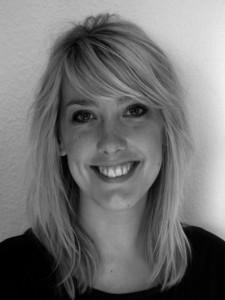 Maja Janmyr is a researcher at the Faculty of Law at the University of Bergen. Her research focuses on public international law; the interplay between international human rights-, humanitarian-, and refugee law; law and anthropology; international legal method; critical human rights; and socio-legal approaches. Read more about Maja Janmyr here:
Maja Janmyr is a researcher at the Faculty of Law at the University of Bergen. Her research focuses on public international law; the interplay between international human rights-, humanitarian-, and refugee law; law and anthropology; international legal method; critical human rights; and socio-legal approaches. Read more about Maja Janmyr here:
Read more about the Centre on law and social transformation here: www.lawandsocialtransformation.no
Plural policing and the safety–security nexus in urban governance
Based on a study of policy frames in urban politics in Sweden, Malmö in particular, this article discusses the safety–security nexus in urban governance. It argues that perceived safety figures as an index of order and integration, and security becomes part and parcel of an expanded cohesion agenda which chain-links criminal justice, immigration control and civic integration. The expanded cohesion agenda in urban governance involves plural urban policing enabled by partnership agreements between the police and local authorities. The article demonstrates how force-based, pre-emptive crime-fighting is intertwined with preventative empowerment programmes; the ‘will to power’ is embedded in ‘the will to empower’. The preferred solution to social problems is extended force-based policing in combination with more police involvement in ‘social’ governance. It is argued that the expanded social cohesion agenda works to ‘criminalize’ specific subpopulations by replacing ‘social’ welfare politics with crime prevention programmes. Under an expanded cohesion agenda, crime prevention has less to do with preventing people from violating the law and more to do with securing the social order. Moreover, it is argued that security politics relates to a broader urban politics aimed at nurturing prosperous diversity considered to benefit the city as a whole, at the cost of problematic difference. In conclusion the article argues that urban security politics lends itself to old welfare state structures, even as responsibility for social crime prevention is devolved ‘downwards’ and distributed across and array of agencies. The social democratic legacy – the revised welfare state – seems to offer favorable conditions for plural policing of minority groups in the city.
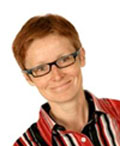 Randi Gressgård is professor at the Centre for Women’s and Gender Research (SKOK), and affiliated with the research unit International Migration and Ethnic Relations (IMER), University of Bergen. Her research interests include migration & minority studies, gender & sexuality studies and urban studies. Among her recent publications are Multicultural Dialogue: Dilemmas, Paradoxes, Conflicts (New York and Oxford: Berghahn Books, 2010/2012) and ‘The power of (re)attachment in urban strategy: Interrogating the framing of social sustainability in Malmö’ (Environment and Planning A 2014, vol. 46).
Randi Gressgård is professor at the Centre for Women’s and Gender Research (SKOK), and affiliated with the research unit International Migration and Ethnic Relations (IMER), University of Bergen. Her research interests include migration & minority studies, gender & sexuality studies and urban studies. Among her recent publications are Multicultural Dialogue: Dilemmas, Paradoxes, Conflicts (New York and Oxford: Berghahn Books, 2010/2012) and ‘The power of (re)attachment in urban strategy: Interrogating the framing of social sustainability in Malmö’ (Environment and Planning A 2014, vol. 46).
IMER Lunch: Astrid Ouahyb Sundsbø – Social mixing policies: What You Want and What You Get
In the public debate and contemporary social policies in Norway as well as in other countries, concentrations of “immigrants” in certain areas of a city are considered to be unfortunate and something which needs to be fought against (see i.e. Gakkestad 2003; Akerhaug 2012). It is anticipated that spatial concentrations of “immigrants” enforces the social isolation of “immigrants” and triggers criminal activities, among other aspects. This becomes very obvious when a “high percentage of immigrants” in an area serves as basis for referring to that area as a “ghetto” or “insecure” (see i.e. Sæter 2005; Vassenden: 2007; cf. Akerhaug 2012).
In this lunch seminar, the idea of social mixing, which is not just common in the general public debate but also a manifested major urban policy and planning goal (Sæter & Ruud 2005; Huse, Sæter & Aniksdal 2010; cf. Musterd 2005) will be discussed. By using some illustrations both from the academic debate as well as own empirical work, it is shown that it is necessary to be critical about this concept.
It is referred to literature arguing that there is a lack of empirical evidence showing that the residential segregation of “immigrants” has any effect at all, for instance on “integration” and crime (for instance Musterd 2005; Galster 2007; Lees 2008). Furthermore, it is discussed that the imagination of social mixing as an ideal way to tackle the “multicultural challenge” might be founded on a highly problematic understanding of “immigrants“ and their norms and values as inherently “bad” (cf. Eriksen 1996: 51). This is shown by drawing on statements from interviews with members from the majority population residing in Oslo.
Astrid Ouahyb Sundsbø
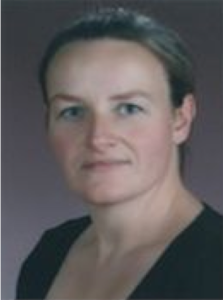 Astrid Ouahyb Sundsbø (PhD) is a postdoctoral research fellow at the Georg-Simmel Center for Metropolitan Studies in Berlin. She holds a doctoral degree in sociology from the Humboldt-University of Berlin (2012). From 2012-2014 she worked as a postdoctoral researcher at the Center for a Sustainable University at the University of Hamburg. Her main fields of research compromise: Social inequality, residential segregation in cities, migration and interethnic relations. Her most recent publication is Grenzziehungen in der Stadt. Ethnische Kategorien und die Wahrnehmung und Bewertung von Wohnorten (Springer VS, 2014) where it is discussed whether ethnic boundary making on the side of the majority population could be a possible explanation for the residential concentration of immigrants in Berlin and Oslo.
Astrid Ouahyb Sundsbø (PhD) is a postdoctoral research fellow at the Georg-Simmel Center for Metropolitan Studies in Berlin. She holds a doctoral degree in sociology from the Humboldt-University of Berlin (2012). From 2012-2014 she worked as a postdoctoral researcher at the Center for a Sustainable University at the University of Hamburg. Her main fields of research compromise: Social inequality, residential segregation in cities, migration and interethnic relations. Her most recent publication is Grenzziehungen in der Stadt. Ethnische Kategorien und die Wahrnehmung und Bewertung von Wohnorten (Springer VS, 2014) where it is discussed whether ethnic boundary making on the side of the majority population could be a possible explanation for the residential concentration of immigrants in Berlin and Oslo.
Sara Kohne: The experience of change in culturally diverse urban areas. Examples from two districts in Berlin and Oslo.
During the last two decades, central inner city areas have constantly become more attractive to the middle class as places for living and leisure. It is especially because of their history and cultural diversity that these urban districts gain ”new” popularity. This development is, among other things, connected to larger processes of economic and societal change, such as globalisation and de-industrialisation, and it is often called gentrification – a process of urban transformation that results in the physical, sociocultural and economic upgrading of city districts.
In taking a qualitative oriented approach on two culturally diverse urban areas that are partly experiencing the process which has just been described, Kohne´s aim is to identify challenges and assets that are experienced by the residents living and working in such districts.
In her presentation, Kohne will present selected findings from her work with the areas Kreuzberg SO36 in Berlin and Grønland-Tøyen in Oslo. She will discuss them in a comparative context.
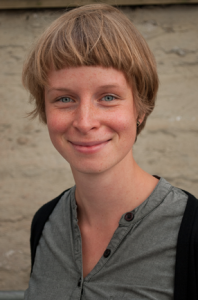 Sara Kohne is a PhD candidate in the discipline of Cultural Studies at the Department of Archaeology, History, Cultural Studies and Religion at the University of Bergen. Her research interests lie within the areas of cultural understandings of place, processes of change, and inequality in urban contexts.
Sara Kohne is a PhD candidate in the discipline of Cultural Studies at the Department of Archaeology, History, Cultural Studies and Religion at the University of Bergen. Her research interests lie within the areas of cultural understandings of place, processes of change, and inequality in urban contexts.
Active citizenship in culturally and religiously diverse societies.
In debates on citizenship in Europe, the need for active participation among citizens is increasingly stressed. But do normative ideas of what active citizenship is, reflect people’s lived experiences in present-day Europe? While the low electoral participation of young people is often highlighted as an indication of reduced civic participation, various studies show increased social media use leads to increased political and social debates and mobilization. And while politicians often lament the lack of civil-political engagement among immigrants particularly, many new citizens volunteer, work as activists, take up political causes, or set up associations in both their countries of residence and origin. In Europe’s culturally and religiously diverse societies, citizens have different frameworks for how they act and interact with their close and distant surroundings. The ACT project studies this diversified citizen participation through empirical data collection on (local, national and transnational) active citizenship in neighbourhoods in Oslo and Copenhagen.
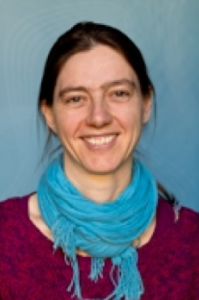 Cindy Horst is Research Director and Research Professor in Migration and Refugee Studies at the Peace Research Institute Oslo (PRIO). Her current research interests include: mobility in conflict; diaspora; humanitarianism; refugee protection; (transnational) civic engagement; and theorizing on social transformation.
Cindy Horst is Research Director and Research Professor in Migration and Refugee Studies at the Peace Research Institute Oslo (PRIO). Her current research interests include: mobility in conflict; diaspora; humanitarianism; refugee protection; (transnational) civic engagement; and theorizing on social transformation.
The Play of Colors: Staging Multiculturalism in Norway
Fargespill (lit. “play of colors”) is a series of musical performances in Norway that have been staged from 2004 to the present. Each performance consists of a sequence of musical and dance numbers performed by children from different minority and immigrant groups, many of whom came to Norway as refugees, together with white Norwegian children. The songs and choreographies represent the home countries of the children who perform, and have included for example music and dance from Somalia, Myanmar (Burma), Rwanda, Kurdistan, and Eritrea, combined together with Norwegian folk music in often elaborate production numbers with colorful costumes and complex musical arrangements. While the specific musical numbers used and cast members change from performance to performance, the concept remains the same – a representation of ethnic, racial and cultural diversity in Norway staged through the voices and bodies of the children on stage. From its beginnings as an cultural initiative in the city of Bergen, Fargespill has gained increasing national attention within Norway, leading to performances in other cities such as Oslo and Trondheim.
Using as a starting point recent theorizations of multiculturalism and critical discussions of race and racism in Norway, this paper analyzes the Fargespill performances. The paper also uses Deleuze and Guattari’s twin concepts of majoritarian/minoritarian to interpret Fargespill’s representations. While the public face of Fargespill is that of children of various immigrant and minority groups, behind the scenes the performances are actually conceptualized, scripted, and extensively stage-managed primarily by majority (white) Norwegian adult arts professionals. The paper especially explores the question of whether the representations of Fargespill constitute a positive contribution to creating a climate for embracing difference in Norway, or whether Fargespill is better understood as a reassuring story white Norwegians tell themselves about multicultural Norway that, at best, naively sidesteps ongoing problems of racism and intolerance toward minorities and immigrants endemic in contemporary Norwegian society. Fargespill’s use of the performing bodies of refugee children to tell its story about a supposed Norwegian multicultural utopia can be seen as especially problematic in the context of the Norwegian government’s recent practices regarding the forced return of long-dwelling child asylum seekers to their country of origin.
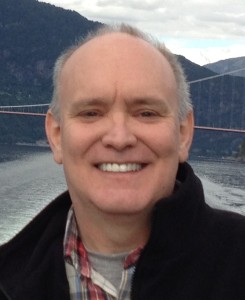 Thomas Solomon is Professor in the Grieg Academy-Department of Music at the University of Bergen. He has previously taught at New York University, University of Minnesota, and Istanbul Technical University. He has done field research in highland Bolivia on musical imaginations of ecology, place and identity, and in Istanbul on place and identity in Turkish hip-hop. His publications include articles in the journals Ethnomusicology, Popular Music, European Journal of Cultural Studies, and Yearbook for Traditional Music, as well numerous chapters in edited volumes on topics such as music and indigeneity in highland Bolivia, orientalism and gender in Turkish popular music, music and postcolonialism, and music and race in American cartoons. He is also editor of Music and Identity in Norway and Beyond: Essays Commemorating Edvard Grieg the Humanist (2011) and African Musics in Context: Institutions, Culture, Identity (2015), and co-editor of Ethnomusicology in East Africa: Perspectives from Uganda and Beyond (2012).
Thomas Solomon is Professor in the Grieg Academy-Department of Music at the University of Bergen. He has previously taught at New York University, University of Minnesota, and Istanbul Technical University. He has done field research in highland Bolivia on musical imaginations of ecology, place and identity, and in Istanbul on place and identity in Turkish hip-hop. His publications include articles in the journals Ethnomusicology, Popular Music, European Journal of Cultural Studies, and Yearbook for Traditional Music, as well numerous chapters in edited volumes on topics such as music and indigeneity in highland Bolivia, orientalism and gender in Turkish popular music, music and postcolonialism, and music and race in American cartoons. He is also editor of Music and Identity in Norway and Beyond: Essays Commemorating Edvard Grieg the Humanist (2011) and African Musics in Context: Institutions, Culture, Identity (2015), and co-editor of Ethnomusicology in East Africa: Perspectives from Uganda and Beyond (2012).
A light lunch, coffe and tea will be served.
Download poster here: Thomas Solomon on the play of colors (pdf)

